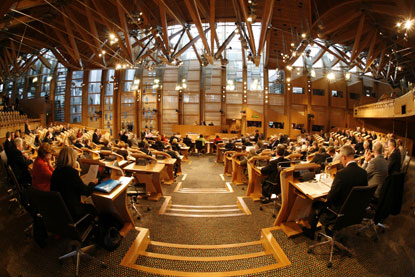By Keith Aitken in Edinburgh | 3 July 2012
The first three powers devolved under the 2012 Scotland Act come into force today, when Holyrood takes charge of drink/drive laws, road speed limits and air gun regulation.
 Scottish ministers will also gain influence over appointments to the BBC Trust, and will be known officially as the Scottish Government, rather than the Scottish Executive. The Act’s more significant reforms, over fiscal powers and borrowing rights, come into effect in 2015.
Scottish ministers will also gain influence over appointments to the BBC Trust, and will be known officially as the Scottish Government, rather than the Scottish Executive. The Act’s more significant reforms, over fiscal powers and borrowing rights, come into effect in 2015.Ministers now plan a series of consultations over coming months to decide what use if any to make of their new powers. One likely change is that Scotland will refuse to follow England’s lead in increasing motorway speed limits to 80mph.
Bruce Crawford, the Cabinet secretary for government strategy, said in a weekend statement: ‘Road safety is our first priority and we have no current plans to increase speed limits.’
Crawford called the Act a missed opportunity. He said: ‘I believe in particular that the Act’s limited taxation and borrowing powers will be out of date long before they actually have any effect. This Act will be remembered for what it did not do.’
The Scottish Government also took on a further role yesterday, with the launch of a not-for-profit scheme to protect the rights of tenants in terms of deposits given to landlords. A similar scheme already exists in England.
It is aimed at preventing landlords from withholding all or part of the security deposits on spurious grounds when tenants leave. The cash will now have to be lodged with one of three arm’s-length bodies. Around 270,000 households and £75m of deposits will be affected.
Meanwhile, Labour’s David O’Neill, leader of North Ayrshire Council, has been elected president of the Convention of Scottish Local Authorities. Michael Cook from Scottish Borders was elected vice-president.
O’Neill replaces the long-serving Pat Watters, who retired at May’s local government elections. Watters was instrumental in negotiating and upholding the concordat between Cosla and the Scottish Government. This gave authorities greater spending discretion in return for a council tax freeze.





















